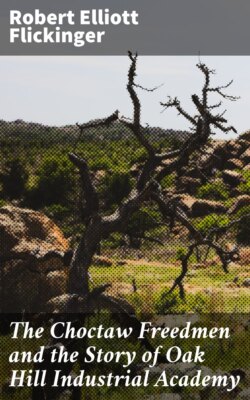Читать книгу The Choctaw Freedmen and the Story of Oak Hill Industrial Academy - Robert Elliott Flickinger - Страница 28
На сайте Литреса книга снята с продажи.
UNCLE WALLACE AND AUNT MINERVA
ОглавлениеUncle Wallace and Aunt Minerva were two of the colored workers that were employed at Spencer Academy, before the war. They lived together in a little cabin near it. In the summer evenings they would often sit at the door of the cabin and sing their favorite plantation songs, learned in Mississippi in their early youth.
In 1871, when the Jubilee singers first visited Newark, New Jersey, Rev. Alexander Reid happened to be there and heard them. The work of the Jubilee singers was new in the North and attracted considerable and very favorable attention. But when Prof. White, who had charge of them, announced several concerts to be given in different churches of the city he added,
"We will have to repeat the Jubilee songs as we have no other."
When Mr. Reid was asked how he liked them he remarked,
"Very well, but I have heard better ones."
When he had committed to writing a half dozen of the plantation songs he had heard "Wallace and Minerva" sing with so much delight at old Spencer Academy, he met Mr. White and his company in Brooklyn, New York, and spent an entire day rehearsing them. These new songs included,
"Steal away to Jesus."
"The Angels are Coming,"
"I'm a Rolling," and "Swing Low."
"Steal Away to Jesus" became very popular and was sung before Queen Victoria.
The Hutchinson family later used several of them in their concerts, rendering "I'm a Rolling," with a trumpet accompaniment to the words:
"The trumpet sounds in my soul,
I haint got long to stay here."
These songs have now been sung around the world.
When one thinks of the two old slaves singing happily together at the door of their humble cabin, amid the dreary solitudes of Indian Territory, and the widely extended results that followed, he cannot help perceiving in these incidents a practical illustration of the way in which our Heavenly Father uses "things that are weak," for the accomplishment of his gracious purposes. They also serve to show how little we know of the future use God will make of the lowly service any of us may now be rendering.
These two slaves giving expression to their devotional feelings in simple native songs, unconsciously exerted a happy influence, that was felt even in distant lands; an influence that served to attract attention and financial support to an important institution, established for the education of the Freedmen.
